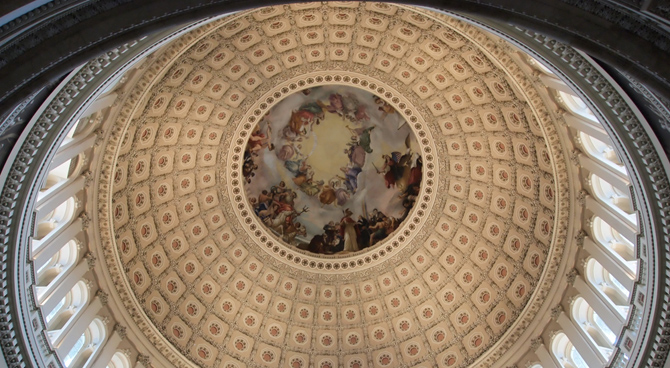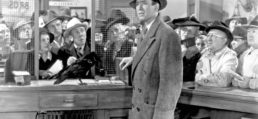The world owes its wealth to the likes of the thrifty lender, but today’s youth are tempted to give it all up.
By Phil Gramm and Mike Solon
Dec. 23, 2019 6:47 pm ET
Frank Capra’s “It’s a Wonderful Life” rose from commercial failure after its 1946 release to Christmas fixture starting in the 1970s. The film tells a story offering insight into how Americans perceive our economy and their role in it. Do the burdens of our economic system, mirrored in the suffering of George Bailey, justify our economic suicide? Whereas today’s Democratic presidential candidates embrace a dark, nihilistic view, most working Americans see our economy and its demands as hard and challenging but ultimately redemptive. The resonance of Capra’s message suggests that America’s future is still promising.
The film’s antagonist is the banker Henry Potter ( Lionel Barrymore), who epitomizes the Democrats’ caricature of unredeemable capitalism. Peter Bailey ( Samuel Hinds ) defends capitalism in an often overlooked dialogue when he asks his son George ( Jimmy Stewart ) to join his building-and-loan business.
George dreams of adventure and wealth and wants no part of “this business of nickels and dimes and spending all your life trying to figure out how to save 3 cents on a length of pipe.”
His father, being older and wiser, responds: “I feel that in a small way we are doing something important. Satisfying a fundamental urge. It’s deep in the race for a man to want his own roof and walls and fireplace, and we’re helping him get those things in our shabby little office.” By squeezing nickels and dimes, the Baileys made limited resources and labor go further, producing “dozens of the prettiest little homes you ever saw, 90% owned by suckers who used to pay rent” to old Potter.
What the Baileys’ penny pinching accomplished in moving Bedford Falls families out of Mr. Potter’s slums has been achieved by real-life Baileys throughout our nation’s history. Those who were able to save pennies enriched all mankind.
Henry Ford saved pennies and put America on wheels, Thomas Edison cheaply electrified the world and Sam Walton’s cost savings brought quality goods to working-class families at prices they could afford. Bill Gates made access to the digital world affordable, Mark Zuckerberg personalized mass communication at no charge and Steve Schwarzman made our pennies work harder so our families didn’t have to.
Peter Bailey’s insight reflects a vision originating in the Enlightenment, which set people free to promote their interest, and in the process, through Adam Smith’s invisible hand, promote the interests of mankind. The Enlightenment’s economic liberation produced a world “a hundred times wealthier today than it was two centuries ago, and the prosperity is becoming more evenly distributed across countries and people,” Harvard psychologist Steven Pinker writes in “Enlightenment Now.”
He continues: “When the Enlightenment began, a third of the children born in the richest parts of the world died before their fifth birthday; today, that fate befalls 6% of the children in the poorest parts. . . . People are putting their longer, healthier, safer, freer, richer and wiser lives to good use.” All this accumulated bounty came from the efforts of countless Peters and Georges who made 3 cents go a bit further.
Which miracle is more miraculous—that so much more is produced now than 200 years ago, or that all this bounty has coincided with plummeting work effort? According to Mr. Pinker, “Americans work 22 fewer hours a week than they did in the late 19th century and lose 43 fewer hours to housework.” In providing so much for so many while requiring so much less work, capitalism’s moral and economic justification is undeniable.
George’s soulful but successful odyssey amplifies his father’s insight. One reviewer of the movie describes George as “a personable fellow who wants to travel and do big things but ultimately finds himself running a building-and-loan association in a one-horse town, married and locked in constant struggle with the greedy old banker of the town.” Another notes that “the events leading up to George’s suicide bid bring out his selfish, abusive side—realistically the inevitable explosion of a man whose personal dreams and ambitions have been continually suppressed and thwarted by the needs and demands of others.”
Generations have felt the same despair in capitalism’s maddening search for the missing pennies to make the numbers work, keep our businesses afloat, secure our jobs, and provide for our families. After the weakest growth in seven decades following the recession of 2007-09, many young people have lost hope seeing their labor produce so little reward. Like George, they stagger drunkenly through a town they want to hate, pondering the economic suicide of socialism without any angel to foretell the nightmare that would result.
They’re enticed by the political promise of a glorified Potterville, where their every need is met by an all-caring and protective government. They would willingly become the “suckers” paying rent to old Mr. Potter, subsisting as wards of a state that buys votes by taxing success. But when the rewards for working and sweating end, prosperity withers and freedom dies.
With the loss of prosperity and freedom, the next generation would lose the moral awakening and fulfillment that flow from economic freedom. Life is hard, and work is necessary, but what makes it all worthwhile is that it bears fruit for the spouse we have decided to love, the children we raise, and everyone else we choose to care for. Capitalism alone respects life’s greatest gift: the freedom to choose how you live your life, where you discover meaning, and what you sacrifice for.
George’s epiphany comes in deciding what makes a wonderful life for him: family, friends and honest toil. While the movie was panned by critics as too sappy, millions have embraced it long after it failed commercially. That suggests Americans identify with Capra’s profound questions and fulfilling answers. The film’s rebirth suggests that when the Baileys of America fully understand the choice they face, they will choose the hard work and fulfillment of economic freedom over the economic suicide of socialism.
Mr. Gramm is a former chairman of the Senate Banking Committee. Mr. Solon is a partner of US Policy Metrics.





